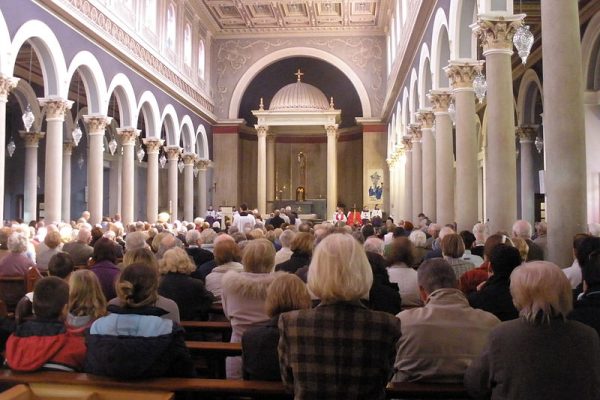Home>Special Themes>What Is A Lenten Service?


Special Themes
What Is A Lenten Service?
Published: February 27, 2024
Ericka Andersen, an editor at Christian.net, expertly merges digital strategy with content creation, focusing on faith and societal issues. Her communication skills enhance the platform's engaging narratives, fostering meaningful dialogue on belief's impact on society.
Learn about Lenten services and their significance in the Christian faith. Explore the special themes and practices observed during this solemn period. Discover the spiritual meaning behind Lenten services.
(Many of the links in this article redirect to a specific reviewed product. Your purchase of these products through affiliate links helps to generate commission for Christian.net, at no extra cost. Learn more)
Table of Contents
Introduction
What Is a Lenten Service? Lenten services are religious gatherings and rituals observed by Christians during the season of Lent, which is the 40-day period leading up to Easter. These services are an integral part of the liturgical calendar for many Christian denominations, including Catholic, Orthodox, and some Protestant churches. Lenten services provide a time for reflection, repentance, and spiritual growth as believers prepare to commemorate the death and resurrection of Jesus Christ. In this article, we will explore the history, purpose, types, elements, and importance of Lenten services, as well as how individuals can participate in these meaningful observances.
History of Lenten Services
The history of Lenten services can be traced back to the early centuries of Christianity. The word "Lent" itself comes from the Old English word "lencten," which means spring. The observance of Lent as a period of fasting and preparation for Easter has its roots in the practices of the early church. The 40-day period mirrors the 40 days that Jesus spent fasting in the wilderness, as described in the Gospels of Matthew, Mark, and Luke. Over time, the Lenten season became established as a time for believers to engage in self-examination, repentance, and spiritual discipline.
The early Christians used Lent as a time to prepare new converts for baptism, and it was also a period of penance for those who had committed serious sins. As the church developed its liturgical calendar, Lenten services became more structured, incorporating special readings, prayers, and rituals to guide believers through this season of reflection and renewal. The observance of Lent varied among different Christian communities and evolved over the centuries, but the focus on self-denial, prayer, and almsgiving remained central to the Lenten tradition.
In the Western Christian tradition, Lent begins on Ash Wednesday and concludes on Holy Saturday, the day before Easter Sunday. The 40-day duration is symbolic of the time Jesus spent in the wilderness, and it excludes Sundays, which are considered mini-celebrations of the resurrection. The Eastern Orthodox churches observe a slightly longer Lenten period, beginning with Clean Monday and ending on the Friday before Palm Sunday. Throughout history, Lenten services have continued to be a significant part of the spiritual journey for Christians around the world, providing a time for introspection, repentance, and preparation for the joy of Easter.
Purpose of Lenten Services
The purpose of Lenten services is multifaceted, encompassing spiritual, communal, and personal dimensions. These services serve as a dedicated period for believers to engage in self-examination, repentance, and spiritual growth as they prepare to commemorate the death and resurrection of Jesus Christ. The following are the key purposes of Lenten services:
-
Reflection and Repentance: Lent provides a structured time for believers to reflect on their lives, examine their relationship with God, and seek forgiveness for their shortcomings. Through prayer, fasting, and acts of self-denial, individuals are encouraged to turn away from sin and reorient their lives toward God.
-
Preparation for Easter: Lenten services serve as a preparatory period leading up to Easter, the most significant celebration in the Christian calendar. By engaging in spiritual disciplines and focusing on the passion and sacrifice of Jesus, believers prepare their hearts to fully experience the joy and significance of the resurrection.
-
Renewal and Spiritual Growth: Lent offers an opportunity for spiritual renewal and growth. Through participation in special worship services, increased prayer, and intentional acts of charity, individuals seek to deepen their faith, grow closer to God, and experience personal transformation.
-
Community and Solidarity: Lenten services foster a sense of communal solidarity as believers journey together through this season of reflection and preparation. The shared experience of fasting, attending special services, and engaging in acts of mercy creates a sense of unity and mutual support within the faith community.
-
Emphasis on Sacrifice and Simplicity: Lent encourages believers to embrace simplicity and sacrifice, mirroring the selflessness and humility of Jesus. By voluntarily giving up certain comforts or indulgences, individuals are reminded of the importance of prioritizing spiritual values over material pursuits.
Overall, the purpose of Lenten services is to create a space for believers to engage in intentional spiritual practices, deepen their faith, and prepare their hearts to fully embrace the significance of Easter. These services provide a framework for individuals to align their lives with the teachings of Jesus, seek reconciliation with God and others, and experience a renewed sense of purpose and devotion.
Types of Lenten Services
Lenten services encompass a variety of worship experiences and spiritual practices that cater to the diverse needs of believers during the Lenten season. These services offer different avenues for individuals to engage in prayer, reflection, and communal worship as they prepare for Easter. Here are some common types of Lenten services observed within Christian traditions:
-
Ash Wednesday Service: The Lenten season commences with the Ash Wednesday service, during which believers receive the imposition of ashes on their foreheads in the shape of a cross. This solemn service marks the beginning of Lent and serves as a reminder of human mortality and the need for repentance.
-
Liturgy of the Hours: Many churches incorporate the Liturgy of the Hours, also known as the Divine Office, into their Lenten observances. This structured form of daily prayer, consisting of psalms, readings, and intercessions, provides a rhythm of devotion throughout the day and is particularly emphasized during Lent.
-
Stations of the Cross: The Stations of the Cross, also called the Way of the Cross, are a series of 14 artistic representations or devotional stations depicting Jesus' journey to the cross. Believers participate in a reflective and meditative service, moving from station to station, to contemplate the passion and suffering of Christ.
-
Penitential Services: These services focus on the themes of repentance and reconciliation, providing opportunities for believers to receive the sacrament of reconciliation (confession) and engage in communal prayers of contrition. Penitential services often include Scripture readings, prayers of intercession, and individual confession and absolution.
-
Tenebrae Service: Tenebrae, meaning "darkness" or "shadows," is a distinctive Lenten service characterized by the gradual extinguishing of candles and the reading of passages that recount the passion and death of Jesus. The service concludes in darkness, symbolizing the solemnity of Christ's sacrifice.
-
Palm Sunday and Holy Week Services: The final week of Lent, known as Holy Week, includes Palm Sunday, Maundy Thursday, Good Friday, and Holy Saturday. Each of these services holds unique significance, commemorating Jesus' triumphal entry into Jerusalem, the Last Supper, the crucifixion, and the anticipation of the resurrection.
-
Eucharistic Celebrations and Fasting: Throughout Lent, many churches emphasize the Eucharist (Holy Communion) as a central component of their worship services. Additionally, fasting and abstinence from certain foods or practices are commonly observed as acts of self-discipline and spiritual devotion.
These various types of Lenten services provide a rich tapestry of spiritual experiences, enabling believers to engage with the themes of repentance, sacrifice, and anticipation of the resurrection in diverse and meaningful ways. Each service offers a unique opportunity for individuals to deepen their faith, seek reconciliation, and participate in the collective journey toward Easter.
Elements of a Lenten Service
A Lenten service is characterized by several distinct elements that contribute to its spiritual significance and reflective nature. These elements are carefully woven into the fabric of the service, creating a sacred space for believers to engage in prayer, contemplation, and communal worship. The following are key elements commonly found in Lenten services:
1. Liturgical Colors
During the Lenten season, the liturgical color used in churches is often purple, symbolizing penitence, preparation, and royalty. The use of purple fabric, vestments, and paraments visually signifies the solemnity and introspective nature of the Lenten period.
2. Scripture Readings
Lenten services feature specific readings from the Bible that focus on themes of repentance, redemption, and the journey to the cross. These readings may include passages from the Old Testament, the Psalms, the Gospels, and the Epistles, guiding believers through the narrative of Jesus' sacrifice and the call to spiritual renewal.
3. Prayer and Intercession
Prayer holds a central place in Lenten services, encompassing both communal and individual forms of prayer. Believers engage in prayers of confession, contrition, and supplication, seeking God's mercy and guidance as they navigate the Lenten journey. Intercessory prayers for the needs of the world, the church, and the community are also integral to these services.
4. Hymns and Chants
The musical component of Lenten services often includes hymns and chants that reflect the somber yet hopeful nature of the season. These musical expressions convey themes of repentance, sacrifice, and the anticipation of Christ's resurrection, providing a melodic backdrop for worship and reflection.
Read more: What Is A Communion Service
5. Homilies and Reflections
Clergy members or spiritual leaders deliver homilies or reflections that expound on the Lenten themes and readings, offering spiritual insights and practical applications for believers. These messages encourage introspection, repentance, and a deeper understanding of the significance of Jesus' sacrifice and resurrection.
6. Rituals and Sacraments
Certain Lenten services incorporate rituals and sacraments, such as the imposition of ashes on Ash Wednesday, the celebration of the Eucharist, and the sacrament of reconciliation. These sacred rituals serve as tangible expressions of spiritual truths and offer opportunities for believers to engage in acts of devotion and renewal.
7. Symbols and Visual Elements
Lenten services often incorporate symbolic elements, such as the use of candles, crosses, and artistic representations of the Stations of the Cross. These visual symbols serve as reminders of the Lenten journey, the suffering of Christ, and the hope of redemption, creating a multi-sensory experience for worshippers.
8. Acts of Almsgiving and Charity
The Lenten season emphasizes acts of charity, mercy, and almsgiving as expressions of love and compassion toward others. Some Lenten services may include opportunities for believers to contribute to charitable causes, engage in community service, or participate in initiatives that alleviate the suffering of those in need.
These elements collectively form the tapestry of a Lenten service, providing a rich and immersive experience that invites believers to engage with the profound themes of repentance, redemption, and spiritual preparation for the celebration of Easter. Each element contributes to the holistic nature of the service, fostering a sense of reverence, introspection, and communal solidarity as individuals journey through the Lenten season.
Read more: When Does The Lenten Fast End?
Importance of Lenten Services
The importance of Lenten services extends beyond mere religious rituals; these observances hold profound significance for individuals, communities, and the broader Christian faith. The following points highlight the multifaceted importance of Lenten services:
-
Spiritual Preparation: Lenten services play a pivotal role in preparing believers for the celebration of Easter. Through intentional practices of prayer, fasting, and repentance, individuals engage in a transformative spiritual journey that culminates in a deeper appreciation of the resurrection of Jesus Christ.
-
Reflection and Self-Examination: The Lenten season provides a designated period for believers to engage in introspection and self-examination. Lenten services offer a structured framework for individuals to assess their spiritual lives, seek reconciliation, and realign their priorities with the teachings of Jesus.
-
Community and Solidarity: Lenten services foster a sense of communal solidarity as believers collectively participate in the Lenten journey. The shared experience of attending special services, fasting, and engaging in acts of mercy creates a bond of unity and mutual support within the faith community.
-
Renewal and Transformation: Lent offers an opportunity for spiritual renewal and personal transformation. Through participation in Lenten services, individuals seek to deepen their faith, grow closer to God, and experience a renewed sense of purpose and devotion.
-
Emphasis on Sacrifice and Simplicity: Lent encourages believers to embrace simplicity and sacrifice, mirroring the selflessness and humility of Jesus. By voluntarily giving up certain comforts or indulgences, individuals are reminded of the importance of prioritizing spiritual values over material pursuits.
-
Reaffirmation of Faith: Lenten services provide a platform for believers to reaffirm their commitment to the Christian faith. The intentional observance of Lent serves as a reminder of the core tenets of Christianity, including the themes of redemption, forgiveness, and the transformative power of the resurrection.
-
Cultural and Historical Significance: Lenten services carry deep cultural and historical significance within the Christian tradition. These observances connect contemporary believers with the rich tapestry of faith practices that have been upheld for centuries, fostering a sense of continuity and heritage.
-
Preparation for Baptism and Confirmation: In some Christian traditions, Lent serves as a period of preparation for individuals seeking baptism or confirmation. Lenten services offer a focused time for catechesis, spiritual formation, and discernment as individuals prepare to publicly profess their faith.
-
Integration of Faith into Daily Life: Lenten services encourage believers to integrate their faith into their daily lives. The spiritual disciplines practiced during Lent, such as prayer, fasting, and acts of charity, serve as a reminder of the ongoing commitment to live out one's faith in practical ways.
-
Anticipation of Easter Joy: Ultimately, Lenten services pave the way for a profound and joyous celebration of Easter. By engaging in the Lenten journey, believers are better equipped to fully embrace the significance of Christ's resurrection, experiencing a renewed sense of hope, joy, and spiritual fulfillment.
In essence, the importance of Lenten services lies in their capacity to facilitate spiritual growth, communal unity, and a deepened understanding of the foundational truths of the Christian faith. These observances serve as a transformative and enriching experience, guiding believers through a season of introspection, repentance, and joyful anticipation of the resurrection.
How to Participate in a Lenten Service
Participating in a Lenten service involves engaging in various spiritual practices and communal observances that are integral to the Lenten season. Whether attending a traditional church service or seeking to incorporate Lenten disciplines into one's personal spiritual journey, the following are ways in which individuals can actively participate in the Lenten season:
-
Attend Ash Wednesday Service: The Lenten season commences with the Ash Wednesday service, where believers receive the imposition of ashes as a sign of repentance and mortality. Attending this solemn service sets the tone for the Lenten journey.
-
Engage in Fasting and Abstinence: Many Christians choose to observe fasting and abstinence during Lent as a form of self-discipline and spiritual devotion. This may involve abstaining from certain foods, activities, or habits as a way of prioritizing spiritual reflection.
-
Participate in Special Worship Services: Attend Lenten-specific worship services, such as Stations of the Cross, Tenebrae, and penitential services, which are designed to guide believers through the themes of repentance, sacrifice, and anticipation of the resurrection.
-
Read Lenten Devotionals and Scriptures: Engage in personal or group readings of Lenten devotionals and Scriptures that focus on the themes of repentance, redemption, and spiritual preparation. This practice fosters individual reflection and meditation on the significance of the Lenten season.
-
Embrace Acts of Charity and Almsgiving: Participate in acts of charity and almsgiving as expressions of love and compassion toward others. This may involve contributing to charitable causes, volunteering in the community, or extending acts of kindness and generosity to those in need.
-
Reflect and Repent: Set aside time for personal reflection, introspection, and repentance. Use this period to assess one's spiritual life, seek reconciliation, and realign priorities with the teachings of Jesus.
-
Participate in Small Group Studies and Discussions: Join Lenten study groups or discussions within the faith community to delve deeper into the Lenten themes, share insights, and support one another in the spiritual journey.
-
Engage in Acts of Self-Denial: Consider practicing acts of self-denial and simplicity, such as reducing consumption, limiting screen time, or refraining from indulgent behaviors, to cultivate a spirit of sacrifice and self-discipline.
-
Attend Holy Week Services: Participate in the special services of Holy Week, including Palm Sunday, Maundy Thursday, Good Friday, and Holy Saturday, which lead up to the celebration of Easter and provide a comprehensive experience of the Lenten journey.
-
Seek Reconciliation and Spiritual Guidance: Take advantage of opportunities for the sacrament of reconciliation (confession) and seek spiritual guidance from clergy members or spiritual mentors to aid in the process of repentance and renewal.
By actively participating in these practices and observances, individuals can immerse themselves in the transformative and reflective nature of the Lenten season, deepening their spiritual connection and preparing their hearts to fully embrace the joy of Easter.
Conclusion
In conclusion, Lenten services hold a profound significance within the Christian tradition, offering believers a structured and transformative journey of spiritual preparation, reflection, and communal solidarity. The historical roots of Lenten observances, coupled with their multifaceted purposes and diverse forms, underscore the enduring relevance of these services in nurturing the faith and devotion of individuals and communities. As believers engage in the elements of Lenten services, they are invited to embrace the themes of repentance, sacrifice, and anticipation of the resurrection, ultimately leading to a renewed sense of hope, joy, and spiritual fulfillment as they celebrate the resurrection of Jesus Christ on Easter Sunday. The importance of Lenten services extends beyond religious rituals, serving as a catalyst for personal and communal renewal, reaffirmation of faith, and integration of spiritual values into daily life. By actively participating in Lenten services and embracing the spiritual disciplines of the season, individuals are able to deepen their connection with God, experience personal transformation, and contribute to the collective journey of the faith community. As the Lenten season unfolds, believers are encouraged to wholeheartedly engage in these meaningful observances, allowing the profound significance of Lenten services to shape their spiritual lives and prepare them to joyfully embrace the Easter celebration.












